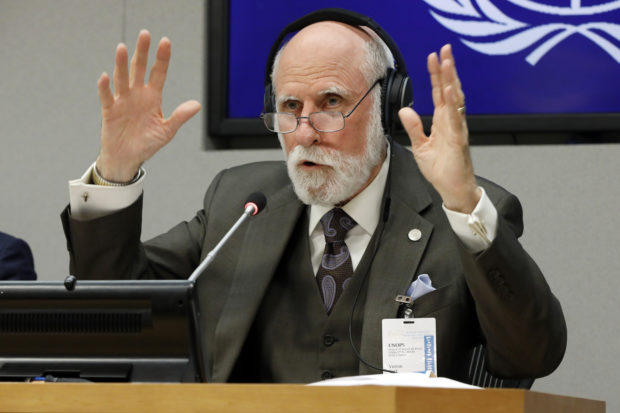UN panel: Connect half the world, and $20 phones can help
UNITED NATIONS — An independent U.N. panel called Monday for much greater cooperation to bring digital technology to roughly half the world’s people, and a senior Google executive said mobile phones with internet access are being created to sell for about $20 that can help make this possible.
Google Vice President Vinton Cerf said at a news conference after the panel’s report was officially launched that “it’s going to cost a lot of money” to end the digital divide.

Vinton Cerf, vice president and Chief Internet Evangelist for Google, answers a question during a news conference at United Nations headquarters, Monday, June 10, 2019. (AP Photo/Richard Drew)
But without driving down costs of phones and communications, he said, “we won’t succeed in getting the other 4.5 billion, or 3.5 billion, people online.”
Nonetheless, Cerf was optimistic. “I think that we’re going to see the investment made primarily out of pure, simple incentive on the business side and demand on the consumer side,” he said.
He said the new cheaper cellphones won’t have all the features of a $1,000 smartphone, “but they have enough to be useful — they have enough to get access to the content of the internet and the applications that it offers.”
Cerf is one of 20 members of the panel established by Secretary-General Antonio Guterres in July 2018 to advance a global dialogue on how the world can work better together to realize the potential of digital technologies to advance the well-being of all people while mitigating their risks.
Article continues after this advertisementIt is led by Melinda Gates, co-chair of the Bill & Melinda Gates Foundation, and by Jack Ma, executive chairman of China’s Alibaba Group.
Article continues after this advertisement“We are living at the dawn of a new digital era,” Ma said in a statement. “Global cooperation among all parties — private sector, government, citizens, academics and civil society — is needed to use technology to achieve more prosperity, more opportunity, and more trust for people around the world.”
Cerf, who is also Google’s “chief internet evangelist,” said the most significant places without access to digital technology are in rural areas, not only in countries in Africa but in the United States, where perhaps 10% to 15% of the population doesn’t have reliable internet access.
In addition to costs, he said, having internet applications that are useful is also a problem.
It’s not helpful if on the web “you can discover a plumber in New York but you happen to be in Bogota,” and you can’t find much in the language you speak, Cerf said.
Norway’s minister of digitalization, Nikolai Astrup, also a panel member, said he strongly believes new technologies can help developing countries make “that quantum leap” to achieving U.N. goals for 2030, including ending extreme poverty while protecting the environment.
“Digital technology is no longer a luxury,” he said. “It is essential for development, also for a developed country like Norway.”
Whatever the cost, Astrup said, it will be overshadowed by the benefits of improving people’s lives, solving some major global challenges and using big data, for example, to predict and prevent famine.
But Gates said in a statement that “digital technologies can help the world’s poorest people transform their lives, but only if we are willing to address the inequalities that already keep them from fully participating in the economic and social lives of their countries.” /gg